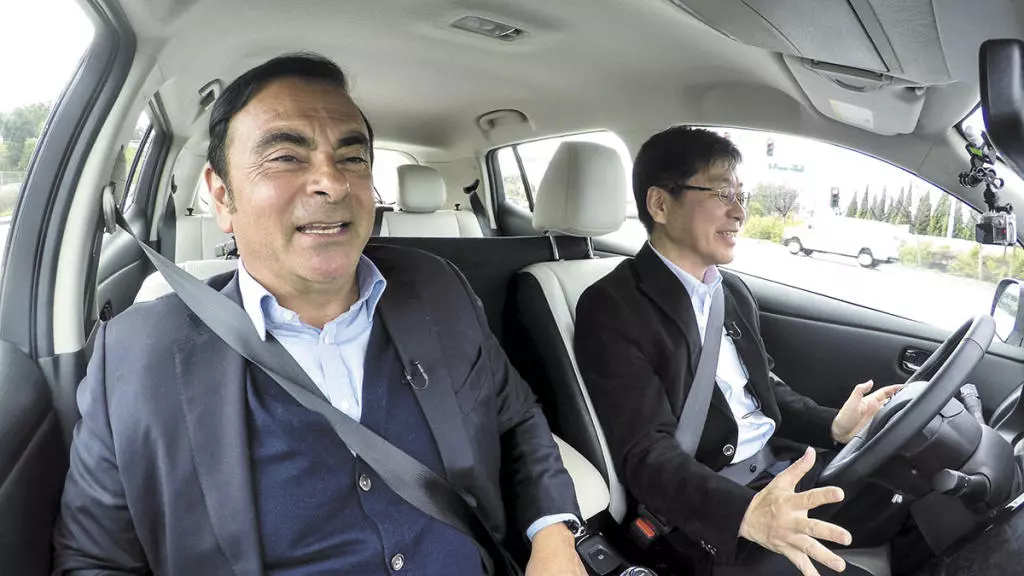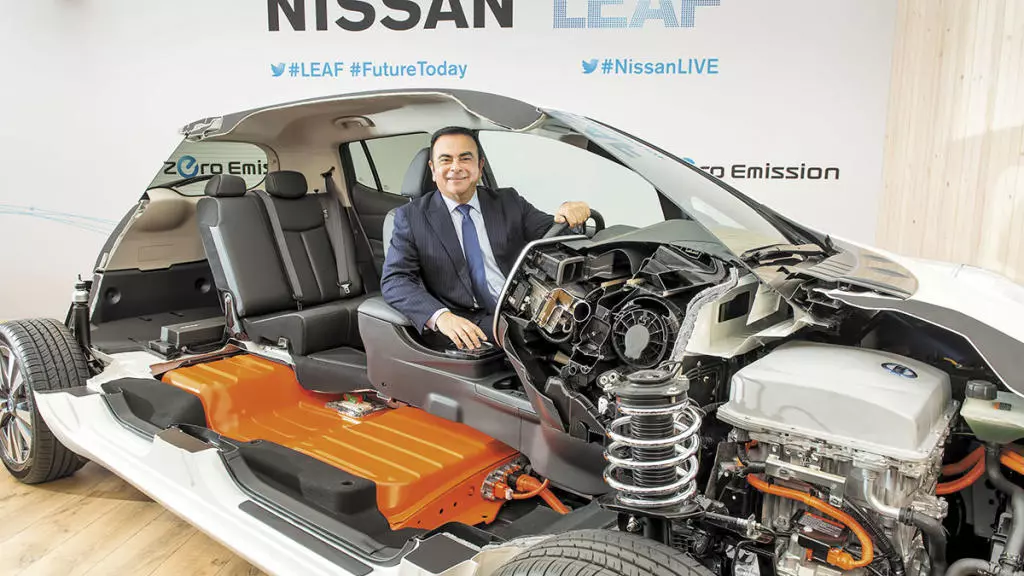Carlos Ghosn: the story of the businessman who managed to escape justice
After being arrested Carlos Ghosn in Japan in 2018, the controversial manager has staged a bizarre escape from justice. He went to great lengths to save Nissan and turned it into one of the most profitable companies in the automotive industry. He was also one of the forerunners of the electric car.
On December 30, the former almighty president of the Renault-Nissan-Mitsubishi alliance surprised the world by escaping from Japan, the country where he was on bail, bound for Lebanon. Carlos Ghosn culminated in this way his annus horribilis, which had begun with his arrest in the Japanese country in November 2018 accused of various economic crimes – such as hiding part of his salary for years to avoid taxes or diverting company funds for personal purposes – that could amount to a total of 70 millions of euros.
Apparently, Ghosn would have fled with the help of companies specializing in escapes hidden in a large box and taking advantage of security flaws at the airports he passed through – presumably those of Osaka and Istanbul. It was the definitive endpoint of the career of one of the most respected managers in the automotive sector.
His grandfather had emigrated from Lebanon, where he was originally from, to Brazil, a country where he directed several companies that traded agricultural products and rubber, as well as another dedicated to aviation. The latter was inherited by Ghosn’s father, allowing the family to enjoy a high standard of living.
In 1960, his mother – born in Nigeria, but also of Lebanese origin – decided to return to the country where he had his roots together with little Carlos – then six years old – and his sister Claudine. After graduating from high school and coming of age, Ghosn moved to France where he studied engineering at the elite École Polytechnique in Paris. Later, he also graduated from the National Superior School of Mines in the French capital.
In 1978, shortly after finishing his studies, he joined Michelin, a company where he worked for 18 years and in which he came to hold various managerial positions: in 1981, he was appointed director of the Le Puy-en-Velay plant –France– and, three years later, he became director of research and development for the industrial tire division.
In 1985, in an unstoppable rise, he became head of the company’s operations in South America. In this way, he returned to Rio de Janeiro, the city where he lived during his childhood, and from which he reported directly to François Michelin, who entrusted him with a radical change in the operations of the French company, which at that time was in serious economic difficulties.
In just two years the division was profitable again. It was his first great success as a manager and the start of a brilliant career. In 1989, he was named president of Michelin North America, so he moved with his family to South Carolina and, a year later, was promoted to CEO of the North American division. Among his missions was directing the restructuring of the company after the acquisition of its hitherto competitor Uniroyal Goodrich.

At that time Ghosn had already achieved great professional prestige and, in 1996, Renault decided to put itself in his hands to try to alleviate its delicate economic situation.
Already positioned as one of the most important managers in the automobile industry, in March 1999, Renault and Nissan decided to formalize a great alliance. Ghosn not only kept his positions in the French multinational but was also appointed chief of operations of the Japanese company. Shortly after, he added the positions of the president – June 2000 – and executive director – June 2001 – of the Japanese manufacturer.
Then, an extraordinary challenge began.
The French-Brazilian, who also has Lebanese nationality and speaks French, Portuguese, English, and Arabic fluently – in addition to having notions of Japanese – faced an almost impossible mission. But Ghosn, who was only the fourth foreigner to run a Japanese car company, got down to business and launched an ambitious and controversial plan to return Nissan to profitability. He was so sure of himself that he even promised to resign if he didn’t reach his goal. And, for this, he did not hesitate to act relentlessly: he fired 21.
In addition to the economic changes, Ghosn decided to go much further, launching a revolution that shook the foundations of the traditional and very conservative Japanese business culture. Thus, for example, it eliminated the promotion system based on age and seniority or dismantled the complex parts supply system that was carried out by other national companies, assuming the risk of becoming an object of public hatred by the proud people. Japanese. In addition, for the first time, it included European and North American executives in key positions and even dared to replace the official language of the company, which became English.
The plan was a resounding success from the start. In the first year of application – in 2000 – Nissan went from accounting for losses of 6,460 million dollars in the previous course to reaching profits before taxes of 2,700 million. Just three years later it was already one of the most profitable manufacturers, with operating margins of over 9% – more than double the industry average. By the end of 2005, Nissan had increased its sales by one million vehicles, from 2.6 million in 2002 to 3.67 million, and by the spring of that year, the net automobile debt had been completely paid off.
Ghosn had more than fulfilled all his objectives and was an icon in the Japanese country. His philosophy was summed up in one sentence: “If you want people to follow you and be successful in great transformations, you have to be sure of the degree of involvement of those who are with you. And that they are convinced that the purpose of the change will be worth it, despite the pain, effort, and sacrifice that it entails.
By that time, his fame had already reached heights unimaginable for a car manager: in November 2001, a series of comic books entitled The True Story of Carlos Ghosn began in Japan., of which more than 500,000 copies of each number were sold. In addition, the main economic publications placed him at the top. In 2002, Fortune named him Asian Businessman of the Year, and in 2003 named him one of the 10 most powerful business leaders outside the United States. Also, in 2004, he became part of the Automotive Hall of Fame.
Ghosn was also one of the first visionaries to realize that the future of the automotive industry was going to lie with electric cars. For this reason, in 2007 it decided to dedicate 4,000 million euros to begin to position itself in this niche and, the following year, confirmed that by 2012 Nissan-Renault would launch a line of zero-emission electric cars throughout the world. At that time, the prestigious business magazine BusinessWeek came to ask if that was crazy.
But Ghosn was very clear: “If you are going to let developing countries have as many cars as they want, there is no other alternative than zero emissions. And the only vehicle of this type available today is electric… That is why we decided to make it.” In December 2010, Nissan launched the Leaf, the first zero-emission mass-produced car at an affordable price for the general public, on the Japanese market.
In June 2012, Ghosn added a new position to his extensive resume, that of deputy director of the board of directors of the Russian car manufacturer AvtoVAZ, with whom Renault began a strategic partnership in 2008, acquiring 25% of its shares. In June 2013, he was named president of the company.

The last of his great achievements in the automotive sector occurred in 2016: Ghosn was the main architect of the great alliance between Renault, Nissan, and Mitsubishi, from which the largest sales group in the world emerged, with some 10.6 million cars sold during 2017; more than 10% of the world total.
The future of Carlos Ghosn is a real unknown. At the moment, trying to avoid a possible diplomatic conflict with Japan, Lebanon has prohibited him from leaving its territory while waiting for the Lebanese Attorney General’s Office to receive the details of the case from the Japanese country. Of course, to prepare his defense he will have a great asset: his enormous fortune.
And it is that, although according to the consulting firm Bloomberg it has been reduced by 40% in the last year -among other reasons due to the bail of 12.5 million euros that he had to deposit to be able to access parole and that he no longer will recover–, this still continues to amount to 57 million euros.
Carlos Ghosn Very personal
Date and place of birth: March 9, 1954, Porto Velho –Brazil–.
Your amazing CV:
- Director of research and development of the industrial tire division of Michelin (1984)
- Head of Michelin operations in South America (1985)
- President of Michelin North America (1989)
- CEO of Michelin North America (1990)
- Executive Vice President of Renault (1996)
- President of Nissan (2000)
- CEO of Nissan (2001)
- President and CEO of Renault (2005)
- President of AutoVAZ (2013)
- President of the Renault-Nissan-Mitsubishi alliance (2016)
Carlos Ghosn insists on his innocence
After completing his escape, Ghosn stated in a massive press conference that “I will no longer be a hostage to a manipulated Japanese justice system where guilt is presumed, discrimination is blatant, and basic human rights are denied.” In addition, he has assured that he is “innocent” and that everything has been a “plot against me for planning the merger of Nissan with Renault.” For its part, the Japanese company has assured in a note that “Ghosn’s escape is an act that defies the Japanese judicial system” and finds it “extremely regrettable.”
Will Carlos Ghosn decide to enter politics?
After Ghosn landed in Lebanon, the leader of the Progressive Socialist Party, Druze Walid Jumblat, even proposed him as Minister of Energy. “If he has built an empire,” he said, referring to his performance at Nissan, “perhaps we can benefit from his experience to end the mafia that has created a massive electricity supply deficit,” said the politician. However, despite the fact that he claims to feel honored and willing “to help Lebanon”, Ghosn has rejected the offer for the time being.
Video game and… movie?
Many have described Ghosn’s escape as a movie, something that seems to have given its protagonist an idea. And it is that, according to what some media have published, the former president of Renault-Nissan-Mitsubishi would have contacted Hollywood producer John Lesher – Oscar winner for Birdman – to offer him to make a feature film about his life.
Although it seems, the proposal has been rejected. Of course, his escape has already inspired a new video game: it’s called Ghone is gone – it can be bought for 0.79 euros – and among the tests that the character must face is that of circumventing the surveillance measures to which Ghosn was subjected in Japan.
carlos ghosn net worth
carlos ghosn family
carlos ghosn documentary
carlos ghosn, nissan
carlos ghosn escape
- where is carlos ghosn now 2021
- carlos ghosn news
- carlos ghosn wife
- fugitive carlos ghosn
- carlos ghosn nissans
- carlos ghosn latest
- renault and nissan
- boss carlos ghosn
- ceo carlos ghosn

